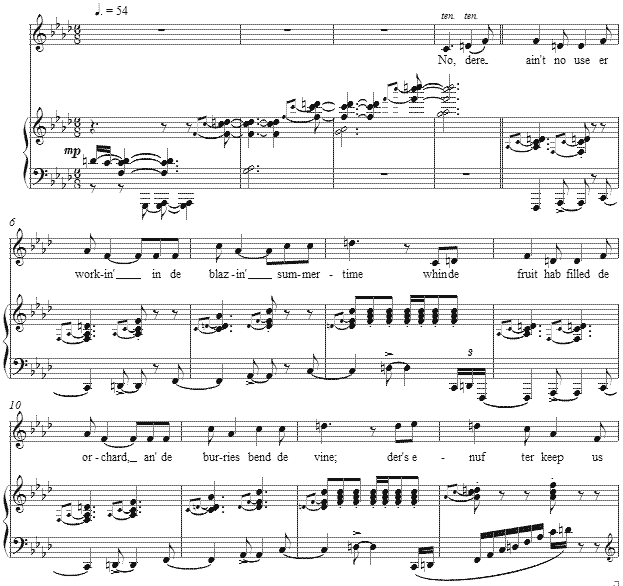Music and Texts of GARY BACHLUND
Vocal Music | Piano | Organ | Chamber Music | Orchestral | Articles and Commentary | Poems and Stories | Miscellany | FAQs
W'en de sun shines hot - (2009)
James Ephraim McGirt
for medium voice and piano
No, dere ain't no use er workin' in de blazin' summertime,
Whin de fruit hab filled de orchard, an' de burries bend de vine;
Der's enuf ter keep us libin' in de little gyarden spot,
An' der aint no use'n workin' w'en de sun shines hot.
Fur I'ze read it in de Bible 'bout de lilies how dey grow,
It was put in der er purpus dat de workin' men mout know,
Dat dis diggin' an er grabben, wusn't men't in our lot,
An' der ain't no use'n workin' we'n de sun shines hot.
Does yer heer de streams er callin' az it cralls erlong de rill;
Does yer se de vines er wavin', biddin' me ter kum an' fill?
Whar's m' hook and line—say, Hannah, give me all de bait yer got,
Fur der ain't no use'n workin' w'en de sun shines hot.
Des 'bout dark I kum hum, strollin' wid a binch er lubly trout;
Hannah she c'mmence er grinnin' little Rastus 'gin to shout;
Soon de hoecake is er bakin', fish er fryin', table sot.
No, der ain't no use'n workin' w'en de sun shines hot.[ 5 pages, circa 3' 30" ]
James E. McGirt
The image comes from the front piece of an early edition of McGirt's Avenging the Maine, a Drunken A.B. and Other Poems (Philadelphia, Penn: George F. Lasher, 1901) which I recently found. I had set another of his texts last year, and noted then how difficult it was to find information about this American poet. See my setting of Nothing to Do for more on the poet.
McGirt writes of writing in dialect -- a feature of much poetry by other American poets like Dunbar, Johnson, Webster and Cummings, as a few examples of a larger body of work -- as part of a preface to his anthology, Avenging the Maine, titled "Explaining Dialect Poems," "You may wonder why the dialect words in my humorous poems are so few compared with those in other dialect poems, but if you will notice such characters as I have portrayed you will find, as I have, that the most illiterate persons, living now among so many who are cultured, do not speak the whole dialect, but speak correctly one-half of their words. So I have written just as the masses impressed me." Just so, as poets throughout time have sought to record images in words of those around them with speech patterns and habits other than their own; it remains a service to later generations to remember and savor such dialects.
This text was first published in The Saturday Evening Post, Sep 26, 1903, and subsequently in McGirt's anthology, For Your Sweet Sake, Poems, Philadelphia: The John C. Winston Co, 1906
The three stanzas are set as verses, with only a short extension as interlude between the second and third verses. As with other music which I have composed, this setting extends a single chord form over many measures by varying the rhythms and voicing of the chord -- F minor with its added major sixth -- to make larger and longer use of what might otherwise be seen to be long and static musical element.
The score is available as a free PDF download, though any major commercial performance or recording of the work is prohibited without prior arrangement with the composer. Click on the graphic below for this piano-vocal score.

